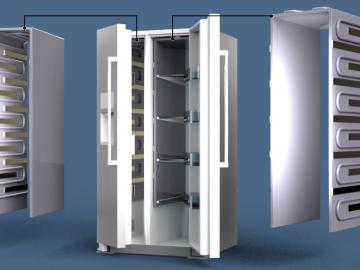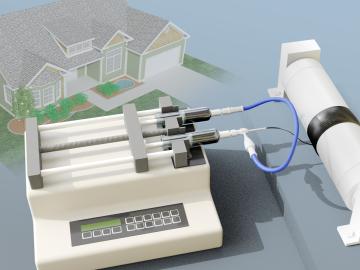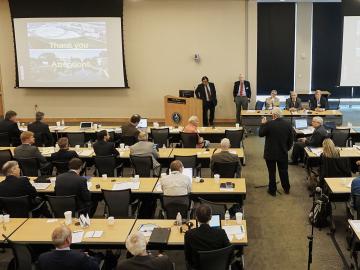Filter News
Area of Research
News Topics
- (-) Buildings (3)
- (-) Molten Salt (3)
- 3-D Printing/Advanced Manufacturing (3)
- Artificial Intelligence (2)
- Big Data (3)
- Biomedical (2)
- Chemical Sciences (1)
- Clean Water (3)
- Climate Change (5)
- Composites (1)
- Computer Science (2)
- Critical Materials (2)
- Decarbonization (2)
- Energy Storage (4)
- Environment (5)
- Fusion (1)
- Grid (1)
- High-Performance Computing (2)
- Isotopes (1)
- ITER (1)
- Machine Learning (2)
- Materials (2)
- Materials Science (5)
- Mercury (1)
- Microscopy (1)
- Nanotechnology (3)
- Neutron Science (4)
- Nuclear Energy (3)
- Physics (1)
- Polymers (3)
- Security (1)
- Simulation (3)
- Space Exploration (1)
- Sustainable Energy (2)
- Transportation (5)
Media Contacts

Researchers at Oak Ridge National Laboratory have developed free data sets to estimate how much energy any building in the contiguous U.S. will use in 2100. These data sets provide planners a way to anticipate future energy needs as the climate changes.

A technology developed by Oak Ridge National Laboratory works to keep food refrigerated with phase change materials, or PCMs, while reducing carbon emissions by 30%.

ORNL researchers have developed a novel way to encapsulate salt hydrate phase-change materials within polymer fibers through a coaxial pulling process. The discovery could lead to the widespread use of the low-carbon materials as a source of insulation for a building’s envelope.

Scientists from Oak Ridge National Laboratory performed a corrosion test in a neutron radiation field to support the continued development of molten salt reactors.

Experts focused on the future of nuclear technology will gather at Oak Ridge National Laboratory for the fourth annual Molten Salt Reactor Workshop on October 3–4.

Oak Ridge National Laboratory has developed a salt purification lab to study the viability of using liquid salt that contains lithium fluoride and beryllium fluoride, known as FLiBe, to cool molten salt reactors, or MSRs. Multiple American companies developing advanced reactor technol...




